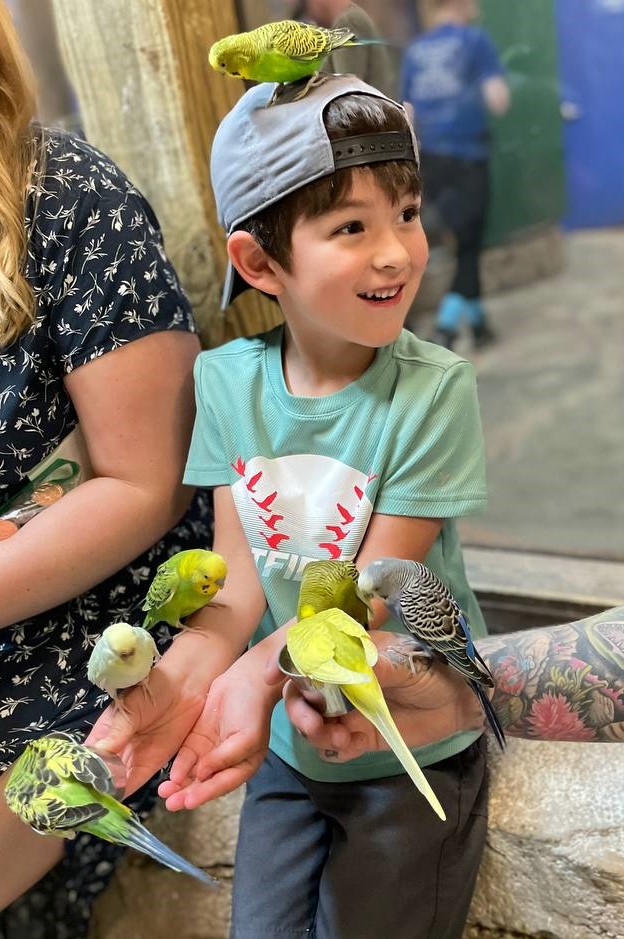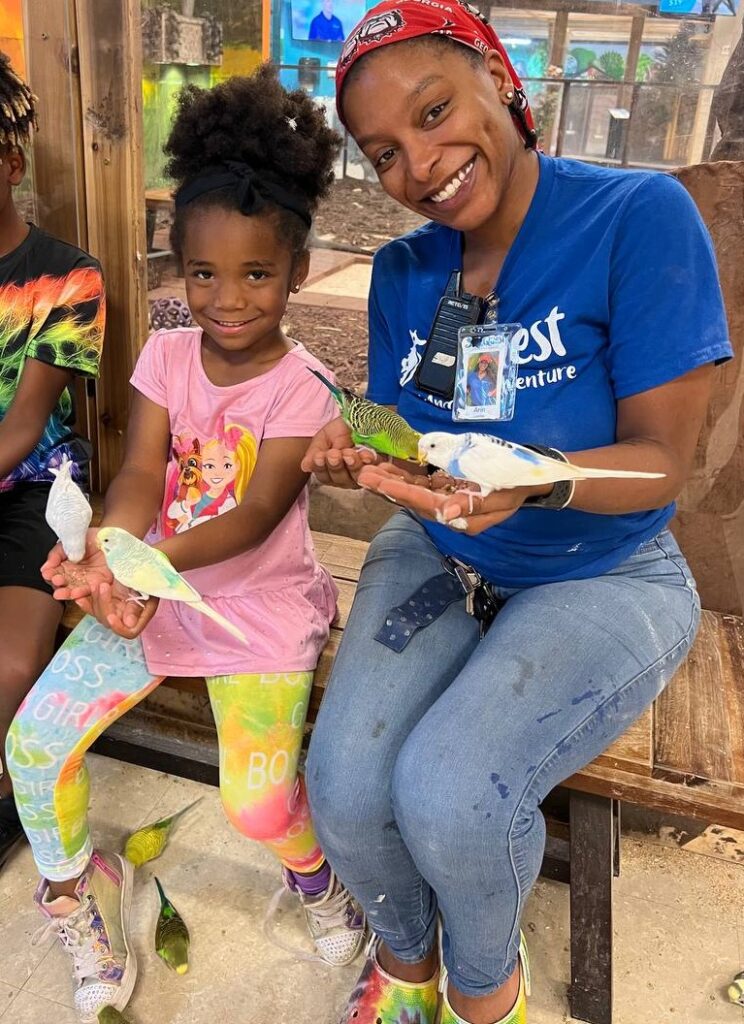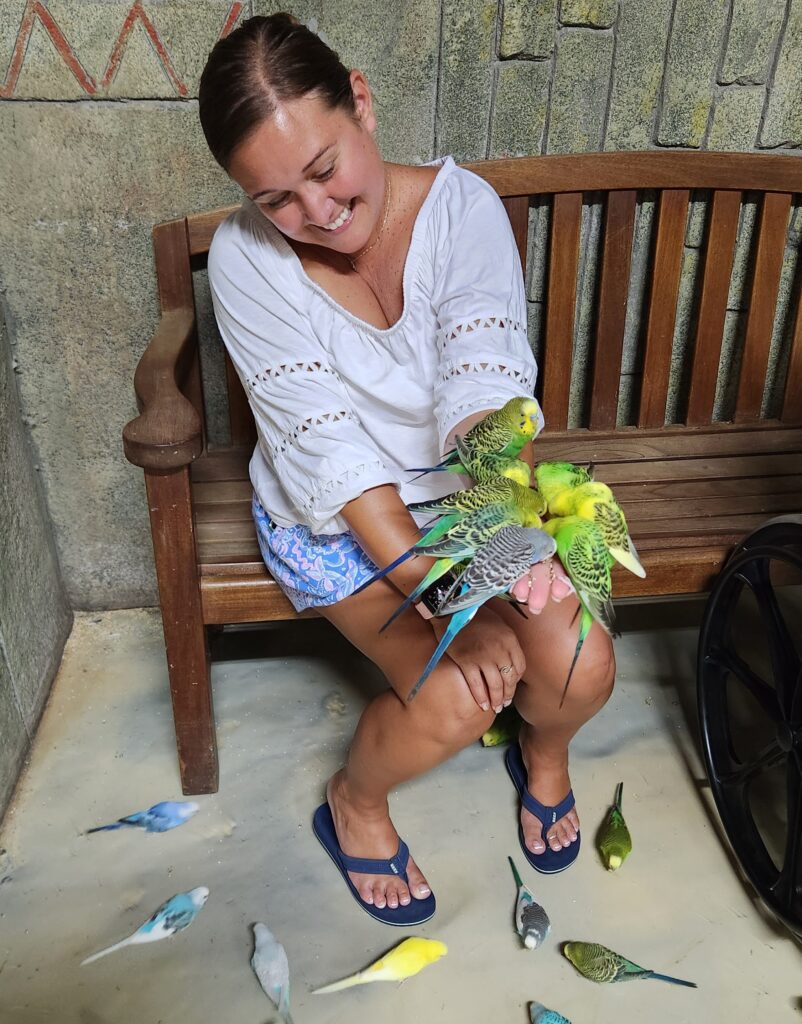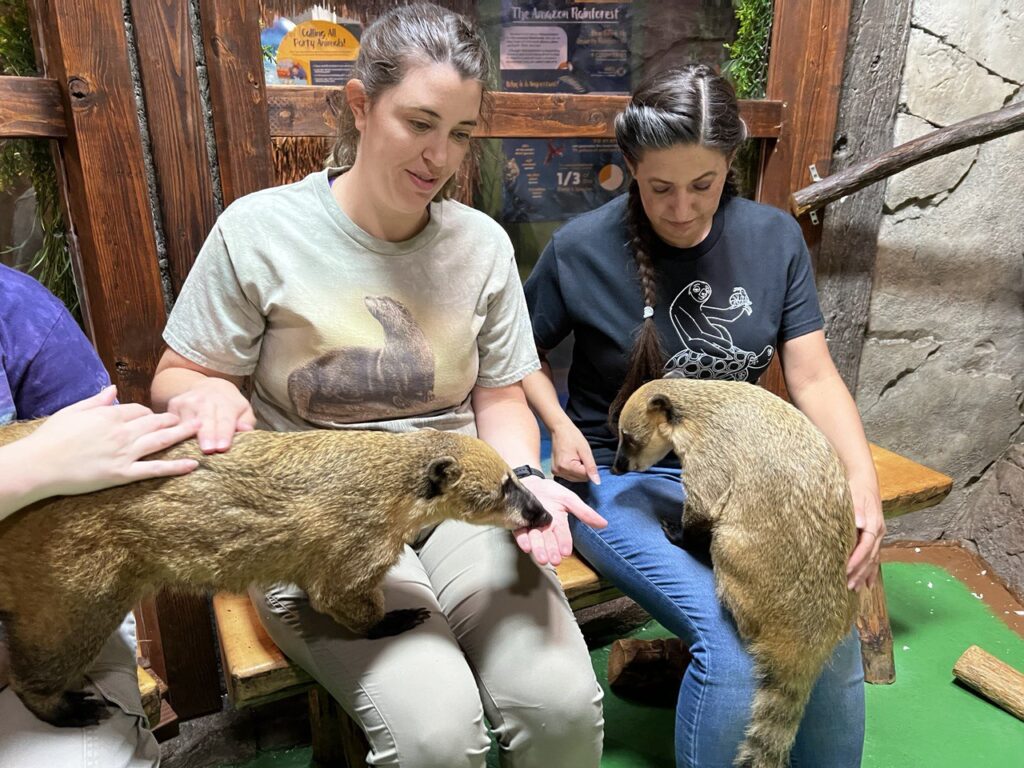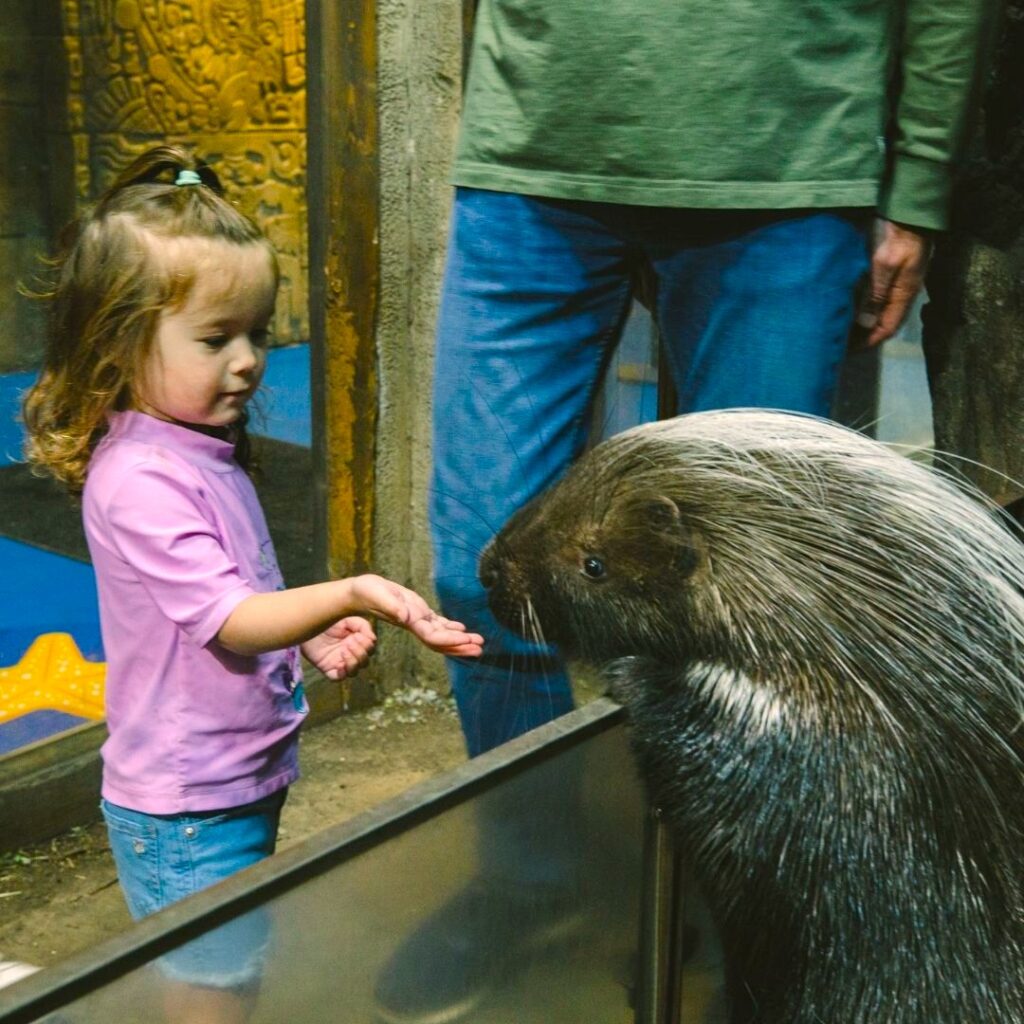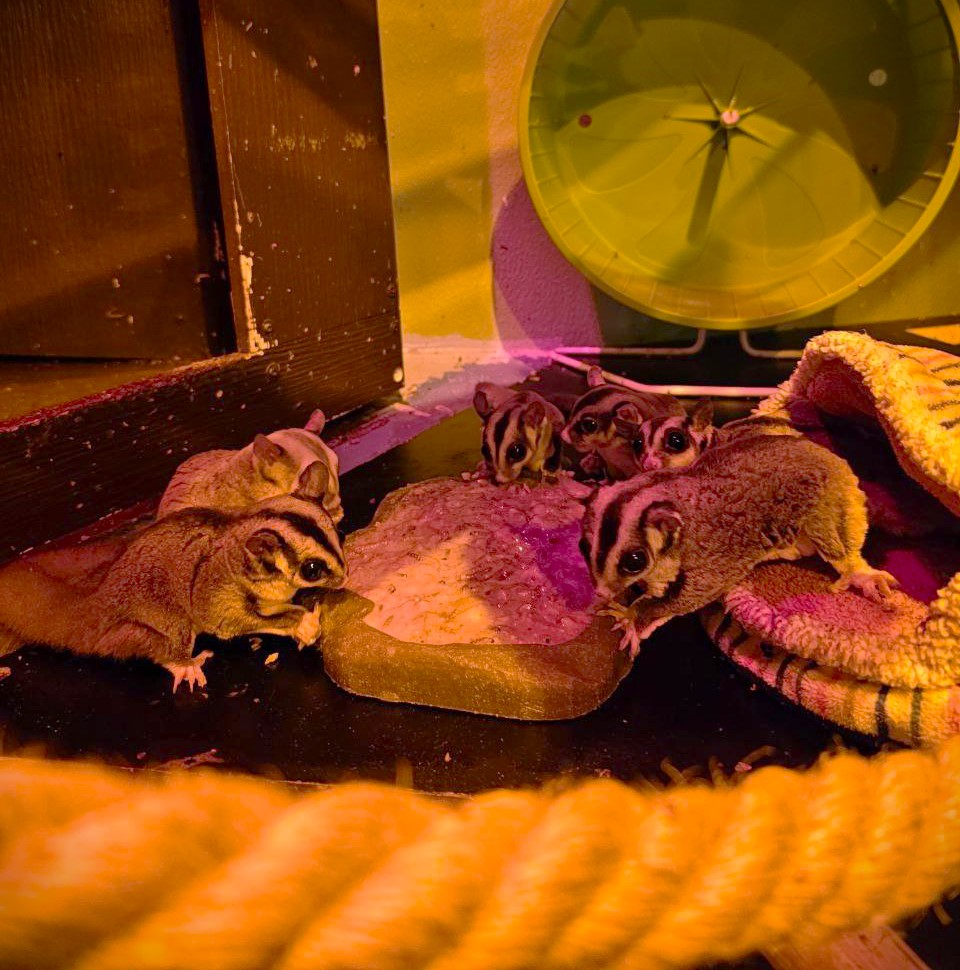How Are Parakeets at SeaQuest Cared For?
Share it on:
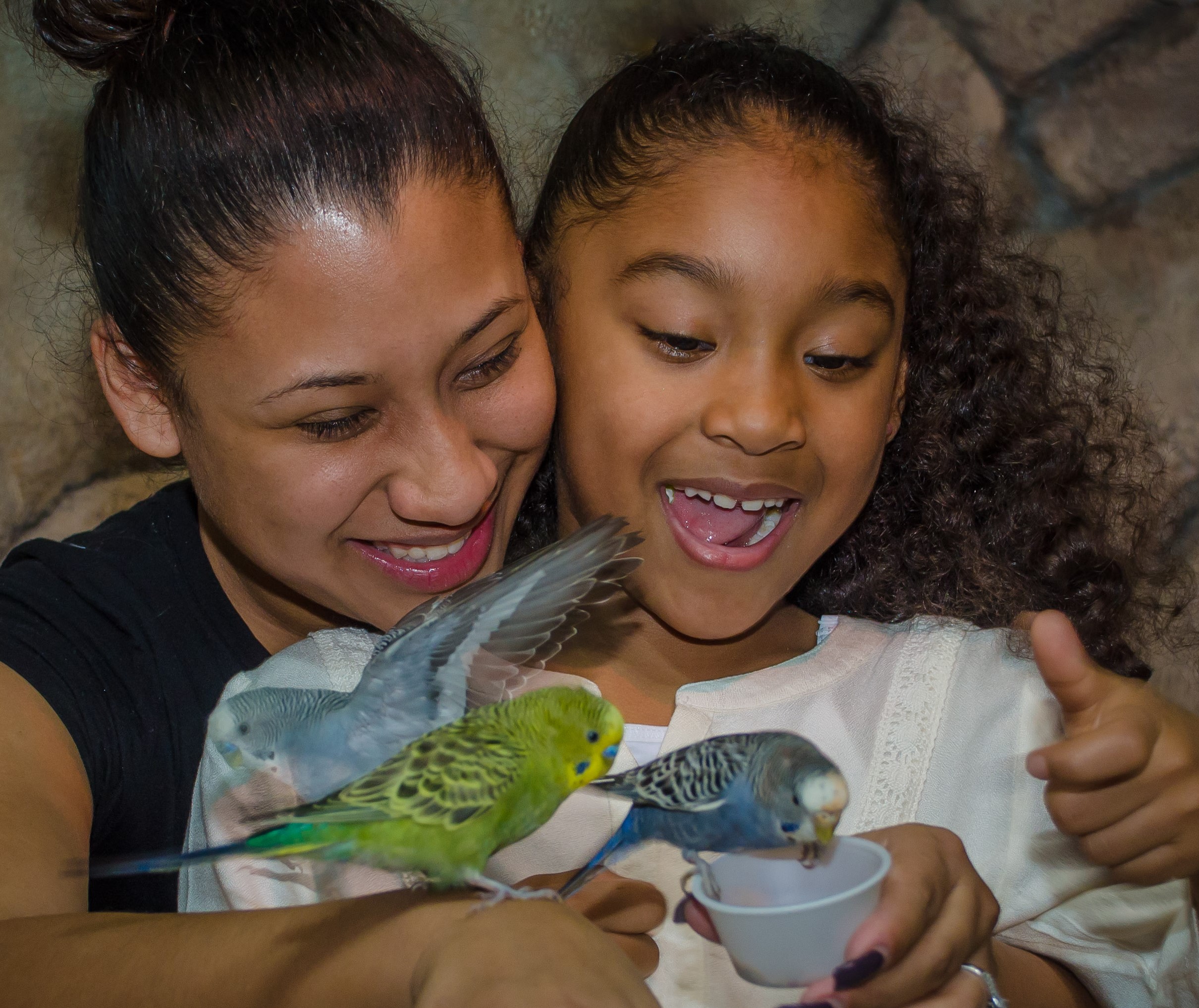
Parakeets have long been cherished companions with their vibrant plumage and charismatic personalities. Yet, within the realm of public aquariums and interactive exhibits like SeaQuest, the care and welfare of the parakeets take on a broader significance. SeaQuest has a meticulous care regimen for the parakeets. We explore their natural habitats, dietary needs, social dynamics, and the intricacies of their psychological well-being.
From veterinary attention to staff training and community engagement, we uncover the multifaceted approach SeaQuest employs to ensure the health and happiness of its resident parakeets.
How is Parakeet Care Handled at SeaQuest?
At SeaQuest, parakeet care is approached with a dedication to the highest animal welfare standards. Behind the scenes, a specialized team of caregivers meticulously tends to the needs of these charming avian residents. This team, equipped with expertise in avian behavior and physiology, ensures that every aspect of the parakeets’ lives is carefully considered and attended to.
Beyond the basics of food and shelter, SeaQuest’s commitment extends to creating enriching environments that promote physical and psychological well-being for these beloved birds. Ethical considerations form the cornerstone of SeaQuest’s animal care practices, guiding every decision and action taken to provide a nurturing and respectful environment for all its inhabitants. Through this holistic approach, SeaQuest sets a benchmark for responsible animal stewardship in public aquariums, fostering a culture of empathy and excellence in parakeet care.
What are Parakeet’s Natural Habitats?
Parakeets originate from diverse habitats spanning Australia, Africa, and South America, thriving in subtropical and tropical regions. At SeaQuest, replicating these environments is crucial for the well-being of these avian residents.
- Habitat Recreation: SeaQuest meticulously recreates lush forests, open woodlands, and grassy savannahs within parakeet enclosures to mirror their natural habitats.
- Environmental Enrichment: Various perches, foliage, and interactive elements adorn the environment, stimulating natural behaviors and providing mental stimulation.
- Physical and Mental Engagement: This enrichment encourages physical activity, mental engagement, and social interaction among parakeets, contributing to their overall well-being.
- Improved Quality of Life: By providing a habitat akin to their natural surroundings, SeaQuest enhances the quality of life for its parakeet inhabitants, ensuring they thrive in captivity while maintaining their vitality.
Through this approach, SeaQuest ensures that its parakeets thrive in captivity, mirroring their natural behaviors and maintaining their vitality.
Do Parakeets Need to Have Natural Sunlight in Their Enclosures?
At SeaQuest, the well-being of parakeets is carefully considered in their enclosure maintenance and arrangement to incorporate natural light without subjecting them to potential harm from direct sunlight. Understanding the vital role natural light plays in their health, SeaQuest utilizes full-spectrum lighting systems when direct sunlight is limited, ensuring the birds receive the necessary wavelengths for their physiological needs.
This approach, coupled with vigilant monitoring, underscores SeaQuest’s commitment to providing optimal conditions for the parakeets’ welfare while maintaining a balance between naturalistic environments and captive care standards.
Do Parakeets Need to be Kept in Pairs?
SeaQuest recognizes the social nature of parakeets and acknowledges the importance of companionship in promoting their mental well-being.
- Social Needs: Parakeets are highly social birds, thriving in the company of their own kind. SeaQuest acknowledges this by housing parakeets in groups or pairs, providing opportunities for social interaction and enrichment.
- Benefits of Companionship: Companionship offers numerous benefits for parakeets’ mental health, including reduced stress, increased stimulation, and enhanced overall happiness. Pairing or grouping parakeets allows them to engage in natural behaviors such as grooming, vocalizing, and playing, which are vital for their social development.
- Monitoring and Management: SeaQuest closely monitors social interactions among parakeets to ensure harmony within the group. This includes observing their behavior, facilitating introductions gradually, and providing ample space and resources to minimize potential conflicts. Additionally, SeaQuest staff are trained to recognize signs of distress or aggression and intervene to maintain a positive social environment.
SeaQuest prioritizes the mental well-being of its avian inhabitants, fostering a supportive and enriching social environment within its facilities.
What Do Parakeets Eat?
Parakeets prefer a typical diet of seeds, pellets, vegetables, and fruit. Each parakeet at SeaQuest receives tailored meals suited to age, activity level, and health status, promoting optimal well-being.
How Long Do Parakeets Live?
The lifespan of a parakeet can vary depending on the species of the parakeet, with a range spanning between 6 years and 30 years! Overall, parakeets in captivity typically live longer than their counterparts in the wild. This is mainly because they have steady access to food, protection from predators, and receive veterinary care.
How We Establish Animal Interaction Protocols at SeaQuest
In recognizing this diversity of preferences, SeaQuest diligently establishes animal interaction protocols to ensure the well-being of both parakeets and guests. Through careful observation, training, and respect for the birds’ individual needs, SeaQuest strives to foster positive and enriching interactions between visitors and parakeets while prioritizing the birds’ comfort and autonomy.
Do Parakeets Like to Be Held?
Exploring the dynamic between parakeets and human interaction unveils intriguing insights into avian behavior. While some parakeets may enjoy human contact, others may find it stressful.
The SeaQuest animal care team undergoes comprehensive training on various aspects of parakeet care, including handling, husbandry practices, and health monitoring, equipping staff members with the necessary knowledge and skills to meet the birds’ diverse needs.
The staff are thoroughly knowledgeable about parakeet behavior, guaranteeing safe interactions. Similarly, visitors receive guidelines on respectful and secure engagement with the birds, emphasizing the importance of approaching them calmly and gently.
Parakeets are generally docile. However, their sharp beaks and claws can risk minor injuries if mishandled or agitated. At SeaQuest, strict protocols are established to ensure the safe handling and interaction with parakeets, reducing potential hazards.
Through prioritizing education and training, SeaQuest aims to provide a secure and enjoyable experience for both parakeets and guests, encouraging positive interactions while minimizing the likelihood of harm.
Safety Precautions for Parakeets and Guests
To ensure the safety of both parakeets and guests, SeaQuest implements various measures to minimize risks and encourage responsible interaction.
- Protective Measures: SeaQuest employs several safety protocols to protect parakeets and visitors. This includes secure enclosures to prevent escapes and measures to reduce potential hazards within interaction areas.
- Guest Education: SeaQuest prioritizes educating guests on proper parakeet interaction. Before entering the interaction area, visitors receive guidance on respectful behavior and handling techniques, emphasizing calm approaches and avoiding sudden movements or loud noises.
- Supervision and Signage: Trained staff supervision is vital for maintaining a safe environment during interactions. Staff members monitor guest behavior and intervene if necessary to ensure the well-being of both parakeets and visitors.
Through these proactive measures, SeaQuest aims to create a secure and enjoyable experience for all, encouraging positive interactions between guests and parakeets while prioritizing the welfare of both parties.
Ensuring the Psychological Well-being of Parakeets
Recognizing the importance of mental enrichment, SeaQuest continuously introduces new toys, puzzles, and foraging opportunities into the parakeet habitats, encouraging natural behaviors and cognitive engagement. Stress reduction strategies are implemented by establishing consistent routines, providing secluded areas for privacy, and minimizing disruptive stimuli within their living spaces.
Socialization is fostered through group housing arrangements that facilitate natural flock dynamics, supplemented by supervised interactions with visitors, which offer additional stimulation and enrichment.
Moreover, SeaQuest’s attentive staff closely monitors the behavior and well-being of each parakeet, allowing for personalized care plans tailored to their individual needs. This comprehensive approach ensures that SeaQuest provides environments that support the parakeets’ natural behaviors and prioritize their psychological welfare, ultimately promoting their overall happiness and contentment in captivity.
Veterinary Care for Parakeets
SeaQuest is deeply committed to the well-being of its parakeet residents, ensuring they receive top-notch veterinary care that covers preventive measures and medical treatments. Our veterinary team follows comprehensive protocols, conducting regular health assessments and implementing preventive measures like routine examinations, vaccinations, and parasite control to keep common ailments at bay and maintain overall wellness.
SeaQuest’s veterinary specialists can deliver swift and effective medical care should any parakeet fall ill or sustain an injury. This may involve diagnostic tests, medication administration, and surgical interventions tailored to address specific health concerns and facilitate recovery.
Working hand in hand with our animal care staff, these specialists play a crucial role in managing parakeet health. They closely monitor the birds’ well-being, collaborate on preventive strategies, and swiftly address any emerging medical issues. Through our expertise and unwavering dedication, SeaQuest ensures that our parakeet residents receive the highest standard of veterinary care, promoting their health and happiness while in captivity.
Training and Education for Staff
SeaQuest provides continuous education and professional development opportunities, offering workshops, seminars, and conferences focused on parakeet care, conservation, and advancements in exotic animal husbandry practices.
By prioritizing ongoing learning, SeaQuest empowers its staff to stay updated on the latest advancements in the field, fostering continuous improvement in their skills. Ensuring its team members possess qualifications and expertise in exotic animal care, including specialized training in avian husbandry and behavior, is a priority for SeaQuest. This guarantees that the parakeets receive care from knowledgeable, experienced professionals who comprehend their needs and behaviors.
Through its commitment to training and education, SeaQuest delivers the highest-quality care for its parakeet residents, advancing their health and welfare. Ultimately, the well-being of our parakeets serves as a testament to the broader significance of responsible animal care in fostering a sustainable and harmonious relationship between humans and the natural world. Through collective efforts and ongoing dedication, we can safeguard the future of parakeets and other wildlife species for generations.

